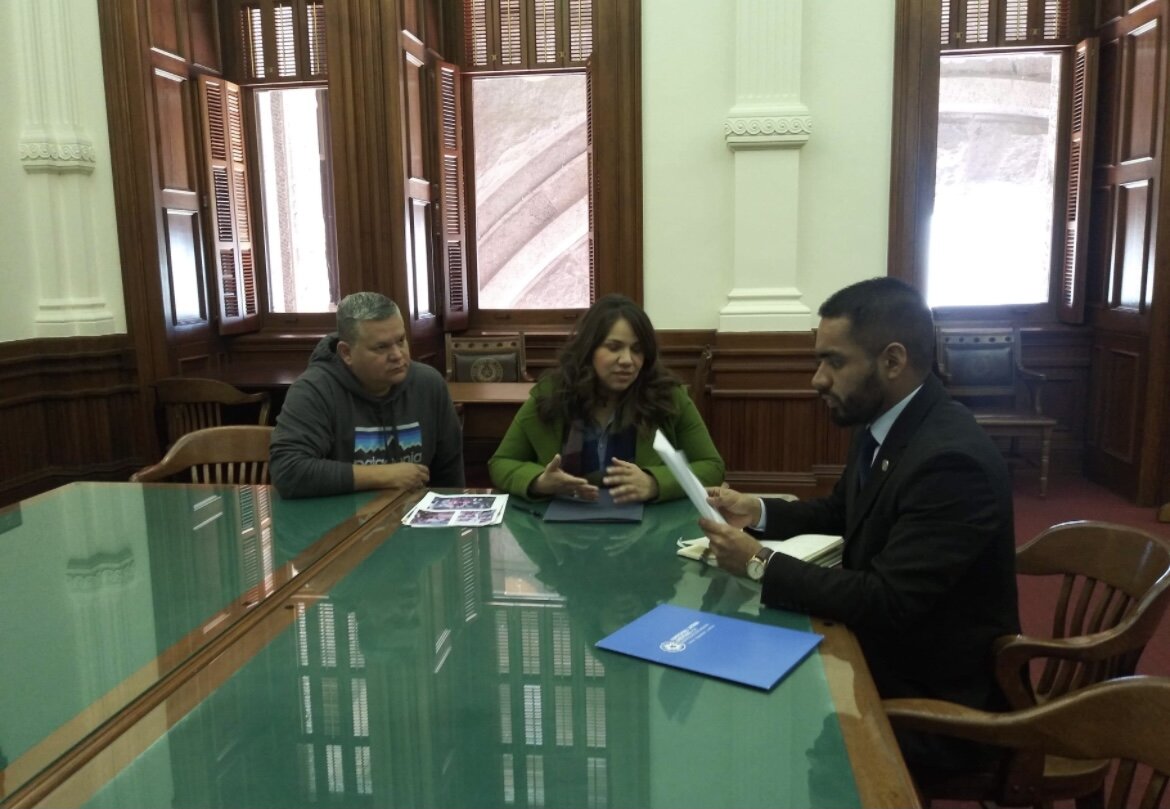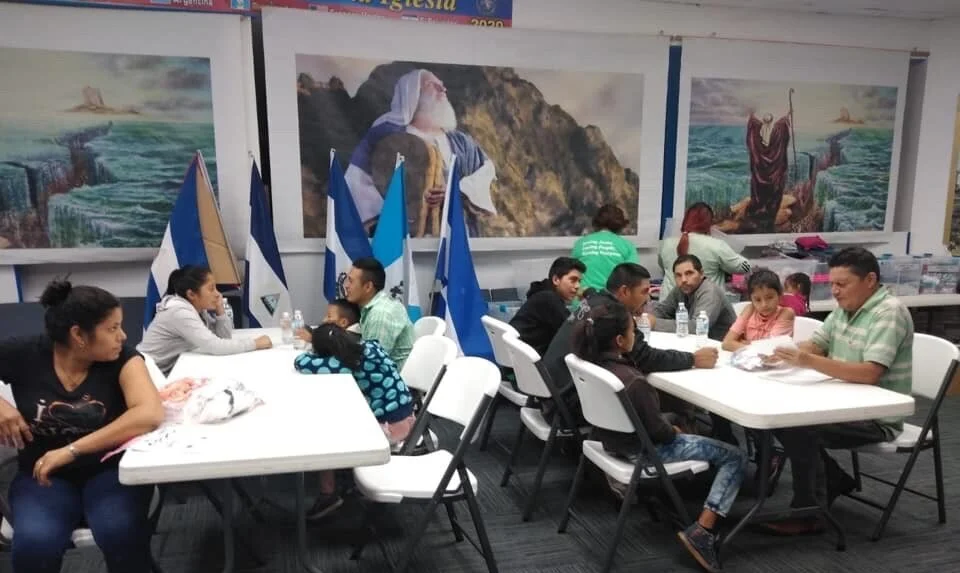What We Do
Mission Statement
Our mission is to provide social support to asylum seekers on both sides of the Texas/Mexico border and organize grassroots efforts that focus on direct aid to asylum seekers.
Our Grassroots Projects
Since 2018, Asylum Seeker Network of Support, Inc. has been designing and creating grassroots efforts tailored to the immediate needs of asylum seekers wherever they are needed.
Our expertise acquired through decades of working with the underserved communities in the Rio Grande Valley as well as our extensive, firsthand experience working with immigrants allows us to create protocols and procedures that provide effective and high-quality services to asylum seekers.
We utilize the basics of trauma-informed care along with compassion, love, and care to provide impactful service that promotes healing within those that receive our service and hope to change the effects of the negative perceptions that asylum seekers have encountered throughout their journeys.
Since the start of 2025, we have since been linking asylum seekers in the USA with legal services for those that do not have the resources. We are striving towards DOJ recognition to help immigrants in this very tough climate.
Swipe Left For More Projects
-
![]()
Coordinator @ Kitchen for Asylum Seekers by Team Brownsville
In 2018, current immigration policy drastically changed during the Trump Administration. A process called metering forced asylum seekers to sign up on a list on the Mexican side of the Gateway International Bridge in the Rio Grande Valley. This is led to persons living on sidewalks, in plazas, and having no access to food, running water, medical care and exposed to the elements.
Team Brownsville began to take supplies to persons waiting for their turn to apply for asylum, and ASNS founder quickly took after the role of coordinator for the Kitchen for Asylum Seekers.
Additional services added under her leadership was providing medical support and taking sick persons and children a block away to local medical consults and pharmacies that allowed for inexpensive treatments options.
It is here where the true complexities of the immigrant journey revealed itself to ASNS founder - issues such as kidnapping, extortion, and death at the hands of organized crime. This is where Gaby Zavala, B.S. was inspired to create an organization that could assist with other forms of direct aid and advocacy for policy change.
-
![]()
Asylum Seeker Advocacy Day
During the legislative session at the Texas Capital, founder of ASNS coordinated meeting with Texas representatives to educate them about the growing situation at the border with immigrants.
Many legislators were unaware of how asylum seekers were being affected by policies like metering. Attendees, such as Michael Benavides, co-founder of Team Brownsville, shared images of the horrific conditions folks at the border had to endure.
We were able to garnish support from representatives from various districts. They committed to supporting our work by representing the issues with persons belonging to federal committees associated with immigration committees.
-
![]()
Created and developed Migrant Respite Center at the Iglesia Bautista West Brownsville Church in Brownsville, TX.
In 2019, the country again saw a major shift in the way immigration entities handled asylum seekers and refugees entering into the United States. Many persons crossing into the US via the port of entry or as undocumented were placed in detention centers for many weeks and months at a time.
This created the image of a crisis on the immigration front, but the actual crisis was the poor treatment of refugees by our US government. All of the asylum seekers had no access to food, proper medical care, showers, clean clothing, or communication during the time they were held in large masses in detention centers, the “hieleras” or iceboxes and cages.
When they were finally processed and released, they were dropped off by CBP at early hours of the morning to the City of Brownsville bus station.
All of the folks were in need of a shower, a meal, medical attention, rest and clothing and supplies.
The City of Brownsville had some shelters assisting, however, they were at capacity and unable to provide trauma informed specialized care for asylum seekers.
That’s when ASNS founder, Gaby Zavala, teamed up with Pastor Carlos Navarro from the Iglesia Bautista West Brownsville. Together they converted the church to a daytime respite center where asylum seekers could shower, eat, sleep, receive new clothes, and engage in prayer and worship if they elected to do so. Over time they were able to serve over 5,000 asylum seekers, as well as open an overnight facility and a shower trailer.
-
![]()
Tacos for Asylum Seekers
ASNS founder had the concept to create a food program that could inexpensively feed hundreds of asylum seekers being dropped off at the Brownsville Bus Station at the very early hours of morning after a young woman named Jasmine came forward with the inspiration to help provide some kind of food.
She saw how the young children tugged on the shirts of their mother saying “tengo hambre mami” or I’m hungry mom. She also noted how the women felt helpless to feed their own children because they did not have resources.
After putting their heads together, the program Tacos for Asylum Seekers was born. A small budget of $35-$40 a day was needed to produce about 200-300 breakfast tacos a day. Volunteers and civic organizations were recruited to adopt a day of providing resources, cooking and delivering the tacos to the bus station at 5am.
ASNS founder provided all the training and tools necessary for Jasmine to become the owner and director of the program, and Jasmine then continued the program on her own.
Over time, they served over 100,000 tacos.
-
![]()
The first Resource Center for Asylum Seekers in Matamoros, Tamaulipas
In 2019, one of the biggest blows to immigration policy, practically breaking down the asylum process in place at the time, was felt - the implementation of the Migrant Protection Protocols happened. It was known as the Remain in Mexico law because it dictated that all persons seeking asylum were subject to awaiting their asylum processes on the Mexican side of the border. All crossings into the US was halted at the time.
Thousands upon thousands of asylum seekers were sent back to Mexico under MPP, many of them sent to the city of Matamoros, Tamaulipas, MX right across the border from Brownsville, Texas.
They were sent back to Mexico through the port of entry and turned into the Mexican immigration system where they were processed and let out to the street on their own without instruction on sheltering, resources, and information on the process for them while in Mexico. Most fell victim to homelessness, violence, extortion, organized crime and death.
ASNS founder felt the need to create a center where asylum seekers can go to access resources, information, legal assistance, medical help, etc. After difficulty in finding office space available for servicing migrants, we identified a small dental office near next to the plaza where the camp sprouted. ASNS founder along with teams of volunteers helped to clean, renovate, and equip the space for attorneys to provide legal charlas and assistance with understanding the legal process of seeking asylum while in Mexico.
The office space proved to be rather small, and then went on to become the office of Ayundales a Triunfar, a local Mexican nonprofit that was also dedicated to providing assistance to immigrants. It has served many asylum seekers and has been become the home base for many organizations over time such as Angry Tias and Abuelas of the RGV and legal providers.
-
![]()
Operation Camp Showers
When MPP was first implemented, thousands of asylum seekers were setting up tents donated by Team Brownsville the plaza area adjacent to the port of entry that corresponded to their upcoming court dates.
As the numbers grew, the asylum seekers started to form a refugee camp off the bank of the Rio Grande River. It was a wooded area wit no electricity, no running water, and no access to food. While humanitarian groups delivered food and donations and supplies, the refugee camp lacked access to water. Many asylum seekers bathed and washed their clothes in the river. Eventually this practice caused many asylum seekers to get skin lesions, stomach infections, and even risked drowning.
ASNS founder soon designed a simple effort to provide clean treated water for a safe alternative to showering in the river. A fundraiser and donation drive for towels, shampoo and hygiene supplies was initiated. it allowed for the purchase of two water tanks and pop up shower tents.
Logistical data was collected on where to access clean treated water in Matamoros, MX, as well as how to have it delivered to the camp. After our first trial round, we were able to provide showers to close to 100 persons. We then coordinated the delivery of the water and operation set up and tear down by hiring a team of asylum seekers.
Our operation went on for months until the Mexican government set up a cement shower block in the camp area of about 40 showers. Our efforts then evolved to manage the showers as they had no effective running water. However, our first effort provided access to clean treated water to the asylum seekers of the camp. Skin lesions and sickness decreased and risks to drowning were eliminated. We also spearheaded the first asylum seeker employment program at the Matamoros refugee camp.
-
![]()
Resource Center Matamoros (RCM)
As our mission to provide services at the refugee encampment in Matamoros, Tamaulipas continues to be necessary, the need for ongoing support is crucial. Due to the COVID-19 pandemic, donations and monetary support for NGO work has significantly decreased, our vision of long term sustainability is becoming more and more difficult. Critical services to asylum seekers include:
-camp management and infrastructure
-implementation of Water, Sanitation, and Hygiene programs and solutions
-daily delivery of clean treated water
-camp clean up and maintenance of thick brush and grass
-temporary housing
-job placement
-social support services and case management
-facilitation of legal services within our building spaces, video conferencing, access to internet, and office space
-asylum seeker income opportunities
-medical case management and transportation
-medication coverage
-advocacy for just treatment of asylum seekers within local, state, and federal levels of government in Mexico, mainly Immigration sector who oversee the camp.
-among so many others; see pictures for a snapshot of daily service to asylum seekers from RCM.
RCM is currently the home of HIAS Mexico, that has provided legal assistance in immigrant issues. RCM has housed initiatives such as Proyecto Corazon, Global Response Management, Trinity on the Border church services, mask sewing programs, children’s photography classes, food donation station during the COVID pandemicl, and has served as the main social support agency for all asylum seekers coming through the city of Matamoros.
We have engaged in medical case management and temporary housing projects to help asylum seekers achieve self sufficiency. We currently provide infrastructure assistance to shelters in Matamoros. shelter migrants in our spaces, as well as coordinate placement in shelters and COVID testing.






